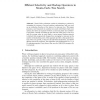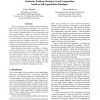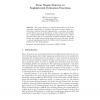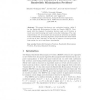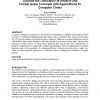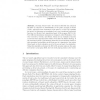CG
2006
Springer
15 years 5 months ago
2006
Springer
Monte-Carlo evaluation consists in estimating a position by averaging the outcome of several random continuations, and can serve as an evaluation function at the leaves of a min-ma...
100
click to vote
UIST
1994
ACM
15 years 6 months ago
1994
ACM
We propose a new evolutionary method of extracting user preferences from examples shown to an automatic graph layout system. Using stochastic methods such as simulated annealing a...
111
click to vote
HICSS
1994
IEEE
15 years 6 months ago
1994
IEEE
We are developing a new problem-solving methodology based on a self-organization paradigm. To realize our future goal of self-organizing computational systems, we have to study co...
CG
1998
Springer
15 years 6 months ago
1998
Springer
This paper discusses a practical framework for the semi automatic construction of evaluation functions for games. Based on a structured evaluation function representation, a proced...
GECCO
2003
Springer
15 years 7 months ago
2003
Springer
Abstract. Designing an adequate fitness function requiressubstantial knowledge of a problem and of features that indicate progress towards a solution. Coevolution takes the human ...
125
click to vote
PPSN
2004
Springer
15 years 7 months ago
2004
Springer
This paper introduces a new evaluation function, called δ, for the Bandwidth Minimization Problem for Graphs (BMPG). Compared with the classical β evaluation function used, our �...
106
click to vote
DIGRA
2005
Springer
15 years 7 months ago
2005
Springer
A general technique is proposed to deal with the formalization of intuition and human-oriented concepts in competition thinking games like chess, such as defensive play, attack, t...
106
click to vote
ACG
2009
Springer
15 years 8 months ago
2009
Springer
Recently, Monte-Carlo Tree Search (MCTS) has advanced the field of computer Go substantially. In the game of Lines of Action (LOA), which has been dominated in the past by αβ, M...
111
click to vote
IAT
2009
IEEE
15 years 8 months ago
2009
IEEE
This paper proposes an automated web site evaluation approach using machine learning to cope with ranking problems. Evaluating web sites is a significant task for web service beca...
